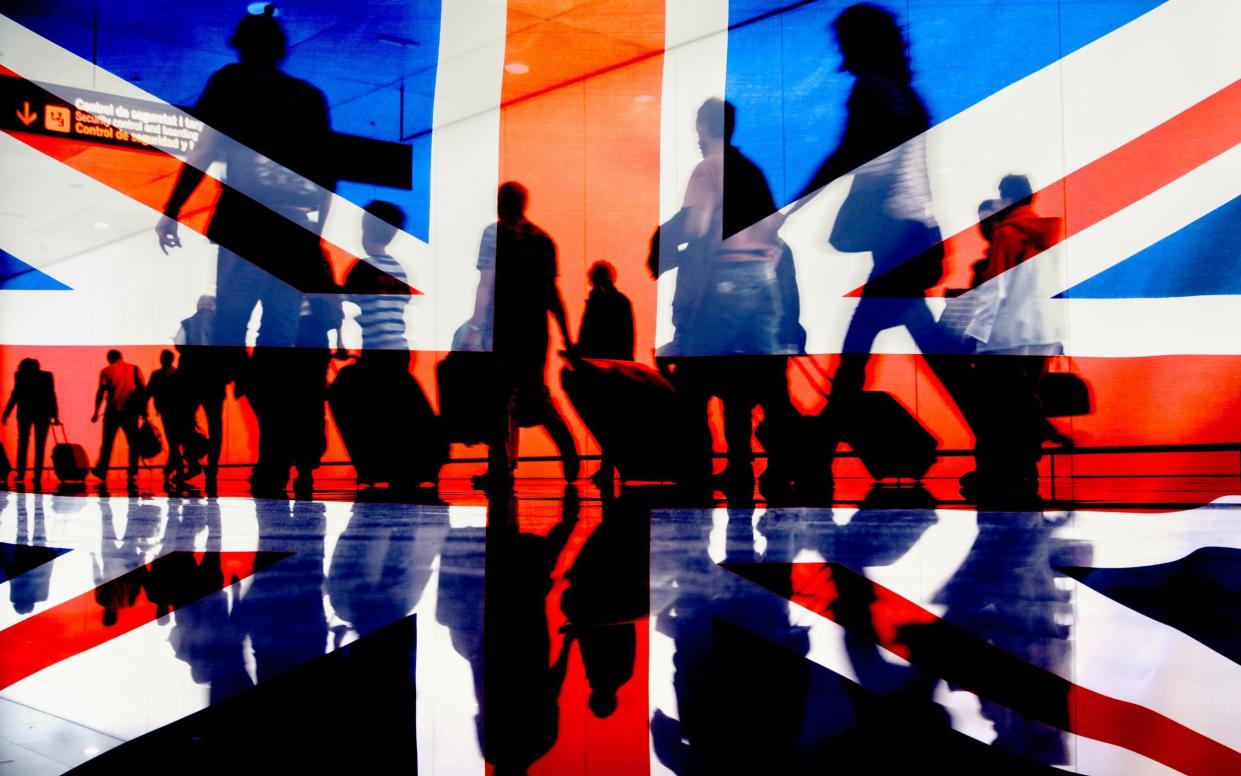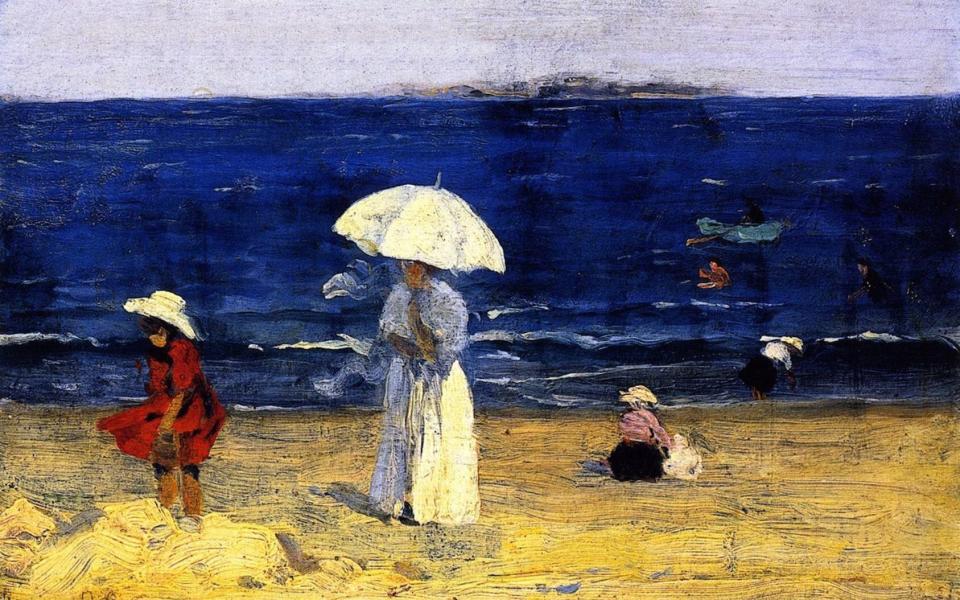Letters: Britain needs a coherent plan for weaning itself off mass immigration

SIR – According to James Cleverly, the Home Secretary, the biggest drivers of immigration are students and health care workers (report, November 24). He says this is testament to our world-leading universities and skills prioritisation.
Would the country not be better off getting British students into university to do useful degrees, and training home-grown health care workers?
Where is the vision to set out paths of advancement for our existing population to replace the short-sighted and unsustainable reliance on immigration?
Rob Mason
Nailsea, Somerset
SIR – Much is made of the benefits of legal immigration – for the NHS and for the economy at large – although it keeps overall wage levels low. Less is said of the visas given to foreign students, ostensibly helping to keep the British university sector afloat.
Given recent reports that some university heads are paid more than £400,000 a year, it is no wonder they need the revenue from overseas students to survive.
Perhaps if the sector trimmed grossly inflated pay packets, it could endure with fewer overseas students, concentrate on our own candidates and reduce net migration.
John Hinton
East Bergholt, Suffolk
SIR – Britain, despite having a significant immigrant population, trails behind Canada and Australia in per capita immigration rates. Both Canada and Australia have implemented effective points-based systems to attract skilled labour, contributing to economic growth.
Recognising the significance of immigration for Britain’s economy, given its low birth rate, highlights the need for a strategic approach to immigration policies. Suella Braverman’s simplistic focus on restricting immigration (report, November 23) serves to deflect from the Conservative Government’s responsibility for declining health and education services.
These issues, which are tied to political stagnation and changed trading relationships with Europe, underscore the importance of addressing core challenges rather than scapegoating immigrants.
Robert Miller
Victoria, British Columbia, Canada
SIR – While stopping the small boats crossing the Channel is important, the numbers are dwarfed by those entering the UK legally.
Has it been a Government smokescreen to hide its total failure to get a grip on all immigration? Brexit promises came to nought.
The fact that these levels are unsustainable, and have been for many years, seems to matter little to the box-tickers allowing it to happen.
Wesley Hallam
Batheaston, Somerset
SIR – Malcolm Symonds (Letters, November 24) concludes: “If the boats have not been stopped before the next election, people will vote accordingly.”
For whom, Mr Symonds? Labour? As Fraser Nelson (Comment, November 24) writes, Sir Keir Starmer “has never spoken about it”.
Rev His Honour Peter Morrell
Nassington, Northamptonshire
Remote civil servants
SIR – In Italy recently, I met a man who told me that he and his wife were making their way back to the UK from Greece, as their Schengen time limit was running out.
He said that he was retired but his wife was a civil servant who had been able to accompany him as she only needed to “work on her computer” (“Remote civil servants can ‘work from beach’”, report, November 19).
Bill Nimmo-Scott
Pewsey, Wiltshire
SIR – Matthew Lynn’s analysis of average working hours by country is eye-opening (“Hard work or no work: Murthy v Musk”, Business, November 4).
It seems the hardest workers are in India, where people work 48 hours a week; in China it’s 47 hours; America 38 hours; and in the UK 36 hours. What’s more, Americans work 46 weeks a year, compared to 40 in France and even fewer in the UK. Do these figures show that hard work is the reason why America is so much wealthier than the UK?
Mr Lynn also reports the finding by the National Bureau of Economic Research that people who work from home are 18 per cent less productive than they are in the office. Given all this, letting civil servants work a four-day week (report, November 20) will harm the economy even more.
Leila Steel
Horley, Surrey
SIR – My colleagues and I made paper every day of our working lives, with no distinctions between days of the year. Pay and hours were annualised, with “overtime” unnecessary. Settled teams came and went together. Quite apart from avoiding the inefficiencies of stop-start shift handovers, the reason was simply the need to make best use of expensive machinery.
A good step towards eliminating the Monday-to-Friday, nine-to-five culture in the NHS (Letters, November 23) would be to stop calling the other hours “unsocial” and all the extra payments for those “unsocial hours payments”. Unsocial for whom? Hardly those who are sick and pay the bills.
Frank Rooney
Stocksfield, Northumberland
SIR – You report (November 7) that staff at The Guardian have been refusing to return to the office, so quite reasonably the management have closed the staff canteen. Suddenly the staff are outraged – although why is a mystery, as they are not in the office.
In my day, refusing to carry out a reasonable instruction from your manager risked a misconduct charge and ultimately dismissal. Clearly not these days, unfortunately.
Geoff Blackman
Mullion, Cornwall
Fallen of Afghanistan
SIR – We are the proud owners of one of Kev Wills’s portraits of the fallen of Afghanistan (“Mission complete: Veteran paints every soldier killed in Afghanistan”, report, November 19).
Our son, WO2 Ian Fisher (Mercian Regiment), was killed in action on November 5 2013. The international interest in Kev Wills’s work is a well-deserved accolade. Long may his success and recognition continue.
Helen Fisher
Hornchurch, Essex
Brexit and intelligence
SIR – Chris Dawson of the University of Bath recently conducted a study which found that the less intelligent a person was, the more likely they were to vote for Brexit (Comment, telegraph.co.uk, November 23). Whatever the assumptions of the study, I object to the implication that Brexiteers didn’t know what they were doing.
I thought it a good idea to forge more effective links with our European neighbours, and I voted to join the Common Market in 1973. Over the following years, member governments sat on their hands while it morphed into an unaccountable gravy train.
In 1998, one of the European Commission’s auditors, Paul van Buitenen, turned whistle-blower, alerting the European Parliament to widespread mismanagement and fraud – leading eventually to the resignation of high-profile members of the Commission, including its president, Jacques Santer.
In 2002, the EU’s new chief accountant, Marta Andreasen, privately criticised the EU’s accounting system for being vulnerable to fraud, and expressed concerns about a lack of transparency. The Commission repeatedly refused to discuss her report, and later that year, out of sheer frustration, Andreasen went public with her concerns – and was sacked for “failing to show sufficient loyalty”.
I suspect that the EU has not changed much since. All that is why I voted for Brexit. Many of those who voted Remain were probably still at school in 1999. I doubt they were aware of these events.
Bill Parish
Bromley, Kent
Cary Grant’s accent
SIR – I was interested to read Nicholas Young’s letter (November 19) about Cary Grant’s assumed American accent. It was particularly ironic that, in Some Like It Hot, Tony Curtis used Mr Grant’s accent to charm Marilyn Monroe as they sat on the beach at the Hotel del Coronado: an American imitating a Bristolian imitating an American. Even the hotel was pretending to be in Miami when it was actually in San Diego, California.
James Harris
Winchester, Hampshire
Formative summer stays on the Emerald Coast

SIR – Reading about Saint-Malo took me back to the many lovely summers I spent in Dinard with my French pen friend (“Wild and wonderful Saint-Malo is France’s most bewitching city”, Travel, November 19).
The family had a big, old-fashioned house there, and I was very lucky. They supplied me with a Solex. I was given sailing and tennis lessons and we had great fun carrying the laundry to the washerwoman. The sheets were thick and white.
We went down to the coast to buy our Sunday oysters – and I have loved oysters all my life.
Jacqueline Davies
Faversham, Kent
Victorious Aussies
SIR – Nick Hoult urged support for Australia in the Cricket World Cup final (Sport, November 18), arguing that the tournament had been unfairly skewed and that the balance of advantage was significantly in India’s favour. As it happened, Australia’s performance in winning the final was flawless and superb.
As an England cricket fan present in the Narendra Modi Stadium, I was persuaded by Mr Hoult’s piece to privately and quietly wish for the performance and outcome that Australia produced. There was only a handful of Australia supporters, with gold shirts and inflatable kangaroos, among the 130,000 fervent Indians – no more than a hundred or so, flotsam in an ocean of blue, their voices hard to hear even when the crowd was silenced by the excellent Aussie cricket.
They all stayed on until the ceremony was completed, a few tiny groups of yellow scattered across an otherwise largely empty stadium, and they deserved to revel in the success of their side after travelling to be present (in a totally alcohol-free state) from goodness knows where.
But the Australian team made no effort to acknowledge or thank the dismal number of supporters, who were palpably disappointed not to have a few moments to share in the celebrations with their idols. The players promptly disappeared to their dressing room (presumably to find cold beer) without a victory lap of the stadium. Hardly an image of a selfless and fair-playing cricket group.
Nicholas Butler
Walton-on Thames, Surrey
Gardening television
sir – I’ve watched Gardeners’ World for many years (Features, November 14). However, I now view a recording rather than the live show. This lets me skip the increasing number of items that shouldn’t really qualify for inclusion. Much airtime is spent “visiting” gardens rather than dealing with practical, hands-on gardening.
This is sad and symptomatic of the times we live in. For an example of a useful gardening programme, I thoroughly recommend Beechgrove.
Phil Page
London N21
Reindeer racket
SIR – My wife and I sympathise with David Ainsworth’s reaction to hearing shops blasting out Noddy Holder during the Christmas season (Letters, November 19).
One December in the 1980s, while serving in the RAF in Cyprus, we made a visit to the brand new Woolworths superstore in Limassol, nicknamed by many the Harrods of Cyprus. To our horror, the public address system bombarded us relentlessly with the sound of a dog barking to the tune of Rudolph the Red-Nosed Reindeer.
Needless to say, we didn’t stay for lunch at the new self-service restaurant.
Sqn Ldr David Higginbottom (retd)
Bramhall, Cheshire
Letters to the Editor
We accept letters by email and post. Please include name, address, work and home telephone numbers.
ADDRESS: 111 Buckingham Palace Road, London, SW1W 0DT
EMAIL: dtletters@telegraph.co.uk
FOLLOW: Telegraph Letters on Twitter @LettersDesk
NEWSLETTER: sign up to receive Letters to the Editor here

